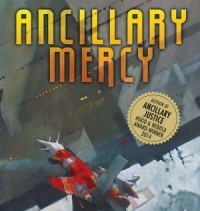The Imperial Radch series is funnel-like. It starts with an eye-opening vision of a civilization ruled by an all-powerful distributed leader, and shows us this through the eyes of the final fragment of a destroyed ship, the last ancillary of the Justice of Toren, betrayed by her ruler in a civil war of a monumental and complex nature, dealing with loss and a crisis of identity on a tragic scale. What vistas, what scope!
As we follow Breq and discover her predicament, her self-imposed mission and the universe in which it all takes place, we are given vast horizons to contemplate. Her mission takes her all the way to Anaander Mianaai, ruler of the Radchaai (or at least one part of her), and there we discover the details of the civil war, the split within Mianaai herself.
In the second book, the funnel narrows. We are taken to Athoek Station, where Breq, now wearing the Mianaai surname, takes control of a politically complex situation, but compared to the war raging in the universe at large, we know that what happens here is a storm in a teacup. Athoek is not critical to the ongoing civil war. Important perhaps, a staging point for future conflict, perhaps, but not the turning point. This gives us an opportunity to examine more closely the social and political consequences of the civilization Ann Leckie has invented for us. This is well done in the second book, which explores the social mores, complex emotional states and intricate rules of conduct of the Radchaai in great detail.
I was hoping that the third book would broaden the scope again, giving us the vistas glimpsed in the first tome once more, and showing us the conclusion of the war into which Breq, her ship and her crew have been entrained.
In fact, we are still at Athoek, and the narrative takes a philosophical turn. Leckie has always liked exploring the societal consequences and complex mannerisms engendered by the culture she has imagined, but here we go into full-on obsessive mode with deep analyses of the internal emotional states and moral convictions of various individuals, all witnessed through the all-seeing connected awareness of our main protagonist. This is a universe in which making tea in the wrong china set can cause such offense that it leads to a depression that needs medication from a professional doctor, and I’m barely exaggerating.
Breq looks very tough in large part because everyone around her is either visibly falling apart or hiding their emotional fragmentation behind vast reserves of stoicism. Every sentence spoken is a minefield, every politeness is a potential insult to a third party, every act a move on a moral and emotional chessboard of ever-increasing complexity, but often of little real consequence. The absence of a supporting influence is enough to cause characters to fall apart emotionally to the point where they must be sedated. This went a little far for me.
Unfortunately, most of this matters little to the physical reality of Athoek system. Athoek, in turn, matters little in the overall scheme of the civil war. Either the very real, very military strategies at play will work in Breq’s favour, or they will not, and Breq rolls the dice on her military decisions with far more recklessness than (s)he manifests in her/his delicate management of interpersonal relations.
So much of the book is internal dialogue explaining the consequences of this or that on someone’s emotional state that it implies the individuals in the story are more important than the civilization tearing itself apart in the background. The civil war unfortunately only serves as a backdrop to the narrative. Don’t misunderstand me, it is interesting to explore how such convoluted social rules lead to extremes of emotion in individuals upon whom entire star systems depend, but I would have preferred it if these emotions were not the dominant thread in the narrative.
I very much enjoyed the first and second books, and was hoping that the third would veer away from introspection and towards Breq’s role in the greater events at work in the universe around her. How does one resist or fight or outwit a schizophrenic, megalomaniacal, near-omniscient multi-bodied ruler who doesn’t know her own mind? I was hoping an answer would be forthcoming. Unfortunately for me, that’s not where this book was going.
Much of what happens here is critically important to the individuals concerned, but in the grand scheme of things, with which we were teased in the first novel, it is a storm in a teacup. Although you’ll soon find out it’s a 3000-year-old teacup that belonged to an extinct dynasty from a conquered world.
Conclusion: Well written, well worth the read, and I did enjoy it, but if the first book set you up with expectations that you were going to see, first hand, the evolution of the Imperial Radch at this turning point in the civilization’s history, reset those expectations before you jump in. Then you’ll be fine.
Addendum: I suppose it would be odd not to comment on the deliberate use of the pronoun “she” to describe every character in the book. This has been commented on to death elsewhere, favourably and unfavourably. It didn’t do much for me, and I would personally have preferred a normal use of pronouns, but it neither makes nor unmakes the book. As you read, you quickly learn to ignore it and it fades into the background apart from occasional moments where it can cause a little gender confusion. It is, however, a relevant brick in the edifice Ann Leckie constructs, and it is relevant to the societal norms and cultural eccentricities that are very much at the heart of the novel, so it has its place here and is more than a gimmick or a political statement.




